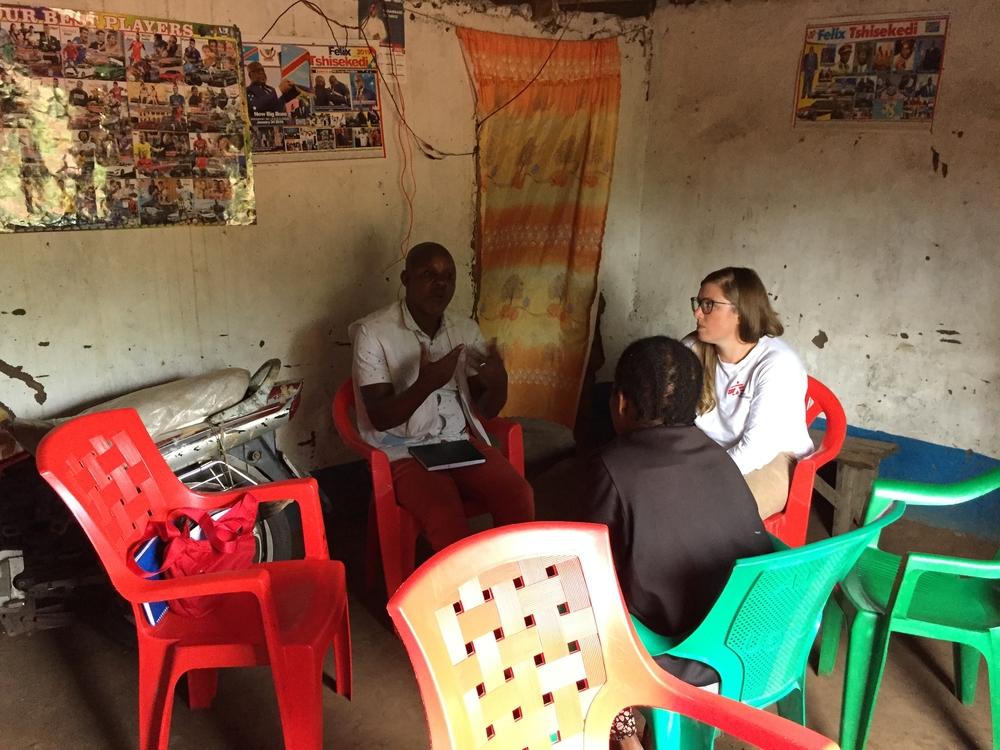In the South East of the South Kivu province, Democratic Republic of Congo, Médecins Sans Frontières (MSF) operates at the Misisi health centre. The mining area of Misisi is home to many miners, sex workers and people living with HIV/AIDS.
In the Health Zone of Kimbi-Lulenge, Misisi looks like an ancient city with a dry and warm environment, where the houses are made of wood. The city is home to gold mining quarries and many men from the Democratic Republic of Congo (DRC) and neighboring countries flock there. The total population, including migrants and minors, is close to 154,000.
Since many men move to Misisi alone, leaving their wives and children behind for months, sometimes years, the demand for sex work is high. While intercourse costs on average between 2,000 and 3,000 Congolese francs (between one and two US dollars), some men are willing to pay up to ten US dollars for unprotected sex.
According to UNAIDS, between 310,000 and 470,000 people live with HIV in the DRC, out of a total population of about 92 million. Given the lack of reliable data for some provinces, particularly due to the large number of the internally displaced, this number is most likely very high in South Kivu, especially in mining areas, due to the large presence of miners, professionals sex workers, traders and migrants.
The province faces a real problem of access to health facilities. People who would like to get tested sometimes walk for long hours before reaching one of the health centers, some of which are not supported by MSF and therefore might not offer free screenings.
Fighting Stigma
At the Misisi health centre, a group of people living with HIV/AIDS are fighting against stigma. Jeancy is a community health educator for MSF. He also belongs to the HIV support group called the Social Committee for Health Promotion. Today Jeancy is meeting with Fabiola, Esperance, David, Marta and Louise. Unlike the majority of people with the disease, support group members do not hide. They appear publicly, agree to have their picture taken and openly testify about this disease in order to raise awareness in the community. They hope to rally more people to their cause in the hope of ending the stigma of HIV one day.
The 35 active members of the support group ensure patients take their treatment correctly, and organise home visits to help them. The support group also ensures everyone receives food items.
"Some patients are not always able to eat properly. Sometimes they miss a medical appointment because they have to procure food. If the patients do not show up for their health screening, they will not receive their medication," explains Louise. "To overcome this, we have acquired a field that allows us to farm in order to help people with HIV/AIDS produce their own food and feed themselves."
Currently, the group follows 558 patients in Misisi registered in the HIV program of the health centre. Of these, a significant majority are women. MSF provides the follow-up program, ensuring medical and psychological care and distribution of medicines is free of charge.
In search of the treasure
According to members of the support group, the high rate of HIV in the region is due to various factors: "We are in Misisi in a mining area where many people, mostly men, are looking for gold and are alone, far from their families. Some use the services of sex workers; others have two women, sometimes more, one here in Misisi and the other in the home of origin. In addition, condom use is not widespread,” Fabiola explains.
In Misisi, the majority of sex workers rarely visit the health centre. "It's hard to stay in touch with them and keep track of them, because they constantly move into different mining areas looking for clients. Some are under the authority of so-called “responsible women”, who manage neighborhoods that include sex-related institutions, called "HQs", headquarters. It is with them that we conduct sensitisation meetings," explains the supervisor and focal point for the service of case management of sexual violence in the Misisi health centre Jamaa Letu.
In addition, it is not uncommon for condoms to tear or to be worn incorrectly. Thus, despite regular screening, the HIV status of these women can change from one day to another given the risk factors associated to their work.
Marta, a member of the Social Committee for Health Promotion, also underlines the lack of education and information. "Many people do not know their HIV status. Some people are very afraid of it and when they think they have it, they do not go to a health facility for fear of being stigmatised,” she says.
At the Kimbi project, MSF teams are working in the Kimbi-Lulenge and Kamambare health zones in the South Kivu and Maniema provinces. The project is focused on supporting primary and community health services. Between January and October 2019, 12,083 people were tested for HIV, with 348 positive diagnoses. Overall, the prevalence of HIV in MSF-supported facilities is between 6-8%. By the beginning of October 2019, 1,618 HIV patients were on antiretroviral therapy since the beginning of the program.
